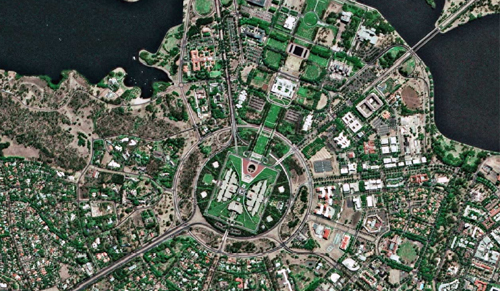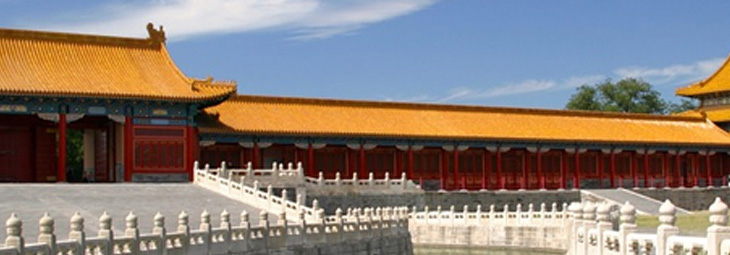


We look back on a successful 44th ISOCARP Congress - Dalian, China (19-23 September 2008)。
2008, Dalian, China -on the theme of‘Urban Growth without Sprawl’
Two congresses in parallel: ISOCARP and UPSC
A very large number of participants met in the two congresses that ran in parallel at Dalian in September 2008, i.e. the ISOCARP congress with up to 300 participants (around), and the annual congress of the Urban Planning Society of China (UPSC) with usually more than 1,200 participants. UPSC is the local organizer for the two congresses.
There were ‘bridges’ between the two events to facilitate synergies, for example, in ISOCARP Congress, there was a considerable scope for specific emphasis on present Asian experiences with sprawling problems in a broad political, cultural, and geographic context. UPSC and ISOCARP also held two Joint Session on Comprehensive planning: a sustainable urban development strategy, and Water Territory Planning Session.
Local Organising Committee (UPSC experts)
Presidents
·Qiu, Baoxing (President)
·Xia, Deren (President)
Steering Committee
·Chen, Weibang (Deputy President, UPSC)
·Fang, Qingfang (Deputy President, UPSC, Vice Director of Guangdong Provincial Construction Committee)
·He, Xinghua (Director, External Affairs Dept. MOC)
·Li, Xiaojiang (Deputy President, UPSC, President, CAUPD)
·Tang, Kai (Director, Planning Department, Ministry of Housing and Urban-Rural Construction)
·Wang, Jingxia (Deputy President, UPSC, Youth)
·Wang, Rusong (President, Ecological Society of China)
·Wu, Liangyong (Professor at Tsinghua Univ. Honorable President UPSC)
·Wu, Zhiqiang (Deputy President, UPSC, Professor at Tongji University)
·Yin, Zhi, Deputy President, UPSC, Prof. of Tsinghua Univ
·Zhang, Quan (Deputy President, UPSC, Vice Director of Jiangsu
Provincial Construction Committee)
·Zhou, Ganshi (President, UPSC)
·Zhou, Yixing (Deputy President, UPSC, Professor at Peking University)
·Zhu, Jiaguang (Deputy President, UPSC)
·Zou, Deci (Executive Vice President, UPSC)
Executive Committee
·Shi, Nan (Chair, Secretary General, UPSC)
·Kong, Yuhang (Dean of Architecture, DUT)
·Geng, Hongbing (Vice Secretary General. UPSC)
·Li, Xun (Secretary General of Chinese Society for Urban Studies)
·Wang, Jun (Director of the Dalian Urban Planning Bureau)
UPSC experts in Congress Team
Workshop Rapporteurs:
·WS 4: Tang Zilai, China
WORKSHOP 4: Metropolitan management as part of an urban development and governance framework, from the national to the local scale
Metropolitan management has several dimensions, political, economic and legislative - in dealing with the array of local authorities that add up to a metropolitan area. The scope of this workshop would include the way in which metropolitan management deals with multiple local authorities and their various degrees of autonomy, or how metropolitan governments are set up under special legislative and financial arrangements. The workshop theme would also include the dual sense of decentralisation, from centralistic to decentralized public systems, and in the form of public-private partnerships. The latter may include various forms of single-purpose or multiple-purpose associations.
4.1 National urban development strategies, and local urban governance including management under local and regional decentralisation policies - cases of success and failure, with a focus on the effects of such strategies on sprawl.
4.2 Rural-urban linkages, their transformation under growing urbanisation, and their translation into sustainable urban management on a national and regional scale.
4.3 City networking and city twinning, and international development cooperation (technical and financial): Learning lessons from other cities through international networks (such as Cities Alliance, City Net, and others); international technical assistance (in what is nowadays typically called urban governance) vs. solid financial support of large projects.
Workshop Chairpersons:
·WS 3: Shi Nan, China
WORKSHOP 3: Concepts and policies against urban sprawl: Compact city, eco-city, city greening, and similar concepts - promises only or real successes
The global debate on how to make urban development more sustainable has generated many conceptual ideas that would promise considerable success if implemented. The focus in this workshop would be on a review of innovative concepts, their translation into policies, and their adoption in practice. The crucial question is whether we are dealing with promises only or real successes that might have been achieved by several factors - strong continuous leadership, favourable economic conditions, and broad public acceptance of innovations.
3.1 Defining “sprawl” as an unintended urban form, clearly distinguishing it from planned de-concentrated forms of urban growth: What are the most relevant concepts and real experiences? Can we formulate a contemporary theory of urban sprawl? Are there convincing examples of progress in avoiding urban sprawl?
3.2 This workshop may include papers on the historical evidence of successfully implementing and enforcing specific concepts of urban form through strong policies and good management (and also lessons learned from initially successful policies that failed in the long run)
3.3 “Internal expansion” as contrasting Programmes to outward expansion and sprawl: Urban re-development, brown field development, densification, and regeneration concepts in practice.
·WS 5: Ruan Yisan, China
WORKSHOP 5: Integrating ecological management and cultural heritage conservation agendas in urban development - new dimensions in many countries
This workshop may include a whole range of papers from theoretical concepts, and experiments, to the actual adoption and integration of innovations in everyday urban management. This topic has been added to the range of topics in the first announcement, adding an explicit focus on ecological and conservation aspects because these concepts are still relatively new in China and other countries in rapid development and transition.
5.1 The definition of sustainable development and its translation into policy includes social, economic, ecological, and political aspects. In many countries, the debate on sustainable (or liveable) cities has brought forward new (or re-discovered) thoughts, and new experiments that are looked at with interest or scepticism.
5.2 The specific emphasis on both cultural heritage and ecological concepts in this workshop session has been added on the request of our Chinese hosts who know this is one of the hottest subjects in today’s urbanisation in China.
5.3 The importance of heritage protection in the form of cultural landscapes adds a socio-political dimension to the more economic discussion of urban sprawl which may be difficult to make operational and even more difficult to enforce, but it is certainly relevant and worth discussing in this congress.
Young Planning Professionals Workshop (s)
·Wang Kai, Director, Working Committee of Youth, UPSC, China
Scientific Committee
·Wang Rusong, China
·Co-opted Scientific Committee Members, 2008 Congress
·Zhou Yixing (Beijing University)
·Zhang Jie (Tsinghua University)